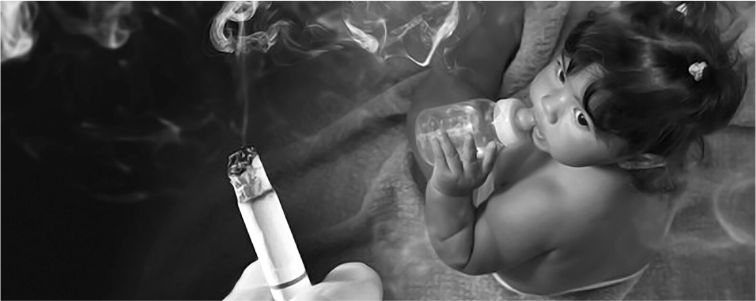Second-hand smoke and vapour, also known as e-cigarette vapour, pose significant health risks to both adults and children. Exposure to these harmful substances can have a detrimental impact on a baby's health, both during pregnancy and after birth.
What is second-hand smoke and vapour?
1. Second-hand smoke:
- Also known as passive smoking, second-hand smoke is the combination of smoke exhaled by a smoker and smoke from the burning end of a cigarette, bidi or other tobacco products.
- This smoke contains over 7,000 chemicals, many of which are toxic and can cause serious health problems.
2. Second-hand vapour:
- Vapour from electronic cigarettes or vaping devices, may seem less harmful than cigarette smoke. However, it still contains nicotine and other harmful substances that can be inhaled by non-users, including babies.
How second-hand smoke affects your baby?
1. Respiratory problems:
- Babies exposed to second-hand smoke are at a higher risk of developing respiratory infections such as asthma, bronchitis and pneumonia.
- They are also more likely to suffer from asthma and frequent coughing or wheezing. Tonsillitis can also develop in babies due to this.
2. Sudden Infant Death Syndrome (SIDS):
- Exposure to second-hand smoke significantly increases the risk of SIDS, also known as cot death.
- Babies who breathe in second-hand smoke are more likely to die unexpectedly during sleep.
3. Ear infections and other defects:
- Babies exposed to second-hand smoke are more prone to middle ear infections, which can cause pain, fever and hearing problems.
- Exposure to these harmful substances has been associated with an increased risk of birth defects, including cleft lip and palate.
4. Low birth weight and premature birth:
- Pregnant women exposed to second-hand smoke are more likely to give birth to babies with low birth weight.
- There is also a higher risk of premature birth, which can lead to long-term health issues for the baby.
5. Impaired lung development:
- Regular exposure to second-hand smoke can impair lung development in babies, leading to chronic respiratory issues later in life.
Risks of second-hand vapour for babies
1. Nicotine exposure:
- Second-hand vapour contains nicotine, which can harm a baby’s developing brain and lungs.
- Even small amounts of nicotine can be dangerous for babies and young children.
2. Chemical exposure:
- Vapour from e-cigarettes contains chemicals such as formaldehyde and acrolein, which are harmful when inhaled, especially for babies with developing lungs.
3. Respiratory issues:
- Just like second-hand smoke, second-hand vapour can irritate the airways and lead to breathing difficulties in babies.
- Babies exposed to second-hand smoke and vapour after birth are more likely to develop respiratory problems, such as asthma, bronchitis and pneumonia.
How to protect your baby?
- Create a smoke-free environment: The best way to protect your baby from the harmful effects of second-hand smoke and vapour is to avoid exposure altogether. Ensure that your home and car are completely smoke-free. Ask friends and family members who smoke to do so outside and away from your baby.
- Avoid vaping around babies: Even if you use e-cigarettes, it’s important to avoid vaping around your baby. The chemicals in vapour can be harmful to their health.
- Educate family members: Inform family members and caregivers about the risks of second-hand smoke and vapour and encourage them to quit smoking or avoid smoking near your baby.
- Encourage smoking cessation: If you or your partner smoke, consider quitting for the sake of your baby’s health. There are many resources available to help you quit smoking and you can discuss them with your healthcare provider.
Second-hand smoke and vapour pose serious health risks to babies, both during pregnancy and after birth. By understanding the dangers and taking proactive steps, you can significantly reduce your baby’s exposure to harmful toxins and give them the best start in life.
Sources:
Raising Children
CDC
NHS



